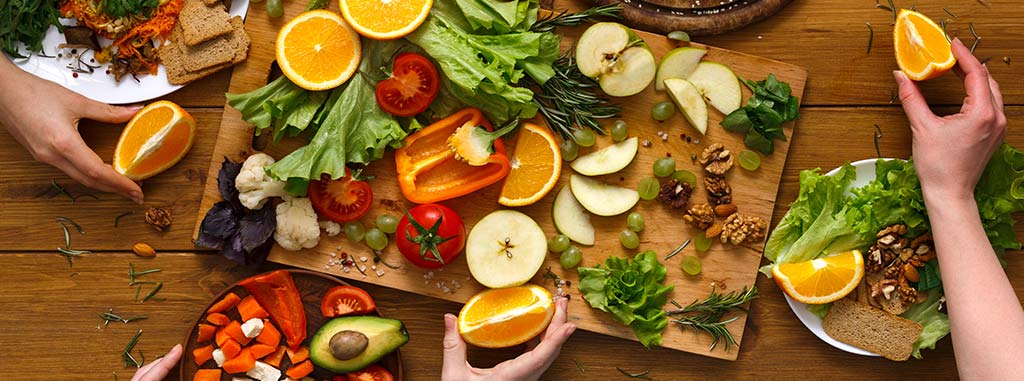12 Vital Rules for Healthy Eating

- Eat food– real food, not industrially processed conglomerates and semi-products filled with chemicals and similar ingredients that are far apart from those “natural” for our bodies (as well as for nature), such as white sugars (or “white death”, another name for sugars), hydrogenated fats, refined white flour (as they say, “the whiter the bread, the sooner you’re dead” – see today’s problem of globally spread celiac disease) and a whole host of other modern “refinements from refineries…” Just do not get your fuel in the same place as cars do!
- Eat living food– food that naturally (and therefore quickly) spoils, as only such food contains natural moulds and bacteria that help balance the inner environment of our organism, such as e.g. unpasteurized milk (from a container), unpasteurized beer, etc. All those chemical emulsifiers, stabilizers, flavourings, preservatives and other chemicals are completely alien to our internal environment.
- Eat simple food – which contains no more than 5 ingredients – it is believed that the more ingredients the packaged food contains, the more it is processed industrially.
- Eat plant food– there is no doubt about the fact that plant food is beneficial for our bodies (unlike today’s excessive meat consumption), especially so-called green vegetables and mainly legumes. In addition, they are less “saturated with energy” the present man is overfilled with, and the plethora of which then leads to a whole series of civilization bodily and mental illnesses.
- Eat home cooked food– if you eat at cheap restaurants and canteens, you should know that quality costs money – it’s just us Czechs who do not want to spend on quality at the expense of quantity – pay more and eat less. You cannot get more bang for your buck! In this case, the best are bioproducts from proven biofarms or ideally from your own garden or vegetable patch, cooked with one’s own hand and “eaten with one’s own mouth” (with good people who’ll be the proverbial icing on the cake).
- Eat in moderation– nowadays it is more important than ever before, or, he who goes slowly goes far. The essence of delicacy is the first bite, not the last. Who eats less, enjoys more. One always feels better slightly hungry than slightly surfeited!
- Eat a variety of food– try to write down what you eat during a week and you’ll see how dull and limited our choice of food is.
- Eat regularly– only regularity, that is, certain order concerning not only food, brings a feeling of harmony to our body.
- Eat slowly– so and in no other way you have the enjoyment and experience of food (French or Italian foodies might tell you), and it is also the only way to be full and therefore eat less and feel better. So the following question is then unnecessary: Did I eat to repletion? And the veracious statement is: I have dulled the edge of hunger and enjoyed the meal!
- Eat in good spirits, with good friends and at the dining table (no, it’s not where your computer is). It is better to eat in a quiet atmosphere (no stress) and it’s better to eat an unhealthy sausage in a good mood, than healthy broccoli when you are stressed (depressed, scared or angry) – you do not have to guess twice what is less evil for our body.
- Eat without extremes – if you occasionally break the principles of healthy eating, nothing essential will happen if the body is healthy enough to compensate such excess. However, if those “feasts” are quite often or you are sick, the consequences will sooner or later manifest in the form of a disease. After gobbling down a feast, it is a good idea to set up a stricter diet for a few days and tighten the belt.
- Eat and treat yourself, because the pleasure of food is one of the reasons why we eat (not just because of hunger). So, everything in moderation… including moderation!
And never forget to have the right breakfast! In the morning it is always necessary first to “light the stove, gradually heat up the furnace so that the stove burns well throughout the day, and only then you can cook on the stove”. Our digestion also works like this: if we use “wet wood” (so-called foods that bring damp and cold such as yoghurts, cheeses, raw fruits and vegetables, fruit juices, green tea …), or, on the contrary “light fire with petrol” (so-called foods that bring fire such as black coffee or alcohol), then both variants are bad and have an unhealthy effect on our digestion and the overall functioning of the organism. An ideal beverage for the breakfast is then the Beverage of Chinese sages which acts as a “firelighter”. To make a fire, “dry wood” is also needed, in our case it is porridge with cinnamon (for example, millet, oatmeal, corn, rice, buckwheat porridge…) or hot soups, e.g. beef or vegetable broths. In this case, it is possible to eat something “unhealthy” during the day (from 11 a.m. to 3 p.m.), without damaging our health (tire or wet wood also burns in a well-made fire…).
Always ask yourself a question – after a good meal, one should feel better than before!


